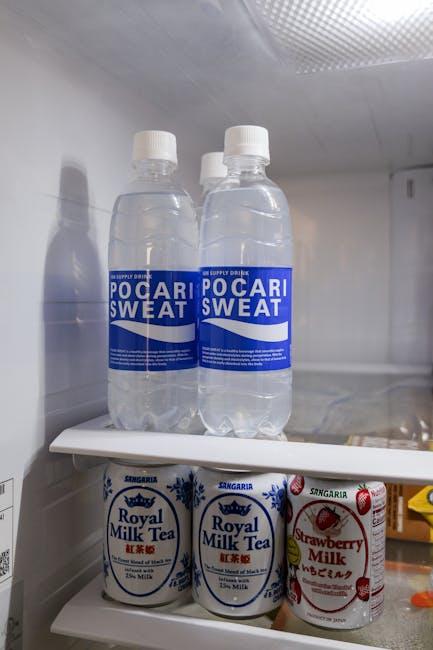In the intricate dance of the keto lifestyle, where carbohydrates take a backseat and fats drive the show, a silent but vital player often goes unnoticed: electrolytes. These tiny charged minerals—sodium, potassium, magnesium, and calcium—hold the power to influence everything from energy levels to muscle function, quietly shaping your keto journey. As you embark on or deepen your ketogenic adventure, understanding the role of electrolytes isn’t just helpful—it’s essential. This article will shed light on what electrolytes are, why they matter on keto, and how to keep them balanced for a smoother, more vibrant experience on your low-carb path.
Table of Contents
- Understanding the Role of Electrolytes in a Ketogenic Lifestyle
- Common Electrolyte Imbalances on Keto and How They Affect You
- Key Electrolytes to Monitor: Sodium, Potassium, Magnesium, and Calcium
- Practical Tips for Maintaining Electrolyte Balance on Keto
- Electrolyte-Rich Foods and Supplements That Support Your Keto Journey
- Q&A
- To Wrap It Up

Understanding the Role of Electrolytes in a Ketogenic Lifestyle
When following a ketogenic diet, the body’s fluid balance shifts, often resulting in an increased loss of key minerals. Electrolytes such as sodium, potassium, and magnesium are essential for maintaining proper nerve function, muscle contractions, and hydration. Without adequate replenishment, keto practitioners may experience symptoms like fatigue, cramps, or dizziness—commonly referred to as the “keto flu.” To keep your body in optimal condition, it’s crucial to understand how these minerals interact and why they’re elevated priorities when carb intake is limited.
Incorporating electrolytes into your daily routine can be both simple and delicious. Here are some practical ways to stay balanced on keto:
- Salt your food generously: Sodium needs rise as insulin levels drop, causing kidneys to excrete more.
- Snack on potassium-rich foods: Avocados, spinach, and salmon are excellent keto-friendly options.
- Consider magnesium supplements: Especially important if you experience muscle cramps or restless legs.
| Electrolyte | Daily Keto Target | Common Food Sources |
|---|---|---|
| Sodium | 3,000–5,000 mg | Salt, broth, olives |
| Potassium | 3,000–4,700 mg | Avocado, spinach, nuts |
| Magnesium | 300–400 mg | Almonds, pumpkin seeds, leafy greens |
Common Electrolyte Imbalances on Keto and How They Affect You
When shifting into ketosis, your body’s water and mineral balance undergo a dramatic reset. This is primarily because reduced carbohydrate intake lowers insulin levels, signaling your kidneys to excrete excess sodium. As sodium leaves, it pulls water out with it, flushing key electrolytes like potassium and magnesium along for the ride. The result? You might find yourself wrestling with symptoms like muscle cramps, fatigue, and even irregular heartbeat—all classic signs that your electrolytes are out of whack.
To keep these imbalances in check, it’s crucial to understand which electrolytes are most vulnerable and why. Here’s a quick rundown of the top culprits and their usual effects:
- Sodium: Loss leads to dizziness, headaches, and low blood pressure.
- Potassium: Depletion can cause muscle weakness, cramps, and palpitations.
- Magnesium: Deficiency often results in restless leg syndrome, irritability, and insomnia.
| Electrolyte | Common Keto Symptoms | Typical Food Sources |
|---|---|---|
| Sodium | Dizziness, fatigue | Salt, broth, olives |
| Potassium | Muscle cramps, palpitations | Avocado, spinach, nuts |
| Magnesium | Leg cramps, insomnia | Pumpkin seeds, almonds, leafy greens |
Key Electrolytes to Monitor: Sodium, Potassium, Magnesium, and Calcium
Maintaining a proper balance of sodium, potassium, magnesium, and calcium is crucial for anyone following a ketogenic diet. These electrolytes play essential roles in muscle function, nerve signaling, and fluid balance, all of which can be impacted by the reduced carbohydrate intake typical of keto. Since keto causes the body to shed more water and electrolytes, being mindful of replenishing these minerals can prevent common side effects like fatigue, muscle cramps, and dizziness.
Each electrolyte has a unique job, and knowing where to focus your intake can help optimize your keto experience. For example, sodium helps regulate blood pressure and fluid levels, potassium supports heart and muscle function, magnesium is key for over 300 biochemical reactions, including energy production, and calcium is vital for bone health and muscle contractions. Here’s a quick glance at their primary functions and daily needs while on keto:
| Electrolyte | Primary Function | Daily Keto Intake Tips |
|---|---|---|
| Sodium | Maintains fluid balance and blood pressure | Increase intake with mineral salts or broth |
| Potassium | Supports muscle and heart function | Consume leafy greens & avocados |
| Magnesium | Energy production and muscle relaxation | Include nuts, seeds, or supplements |
| Calcium | Bone strength and muscle contractions | Eat low-carb dairy or leafy greens |
Practical Tips for Maintaining Electrolyte Balance on Keto
Staying vigilant about your electrolyte intake is essential when embarking on or maintaining a keto lifestyle. The rapid reduction in carbohydrate consumption often leads to a water and mineral imbalance, which can leave you feeling sluggish or experiencing “keto flu.” To counter this, prioritize foods rich in magnesium, potassium, and sodium. Think leafy greens like spinach, avocados, and nuts for magnesium, and sprinkle a pinch of sea salt on your meals to replenish sodium levels effectively. Incorporating these nutrients naturally supports not just hydration but also muscle function and overall energy.
In addition to dietary choices, consider simple daily habits to maintain balance:
- Drink plenty of water but avoid overhydration which can dilute electrolytes.
- Use electrolyte supplements designed for keto dieters if you find diet alone insufficient.
- Monitor your physical symptoms and adjust your intake accordingly, especially on active days.
| Electrolyte | Best Keto Sources | Daily Target |
|---|---|---|
| Magnesium | Spinach, Almonds | 300-400 mg |
| Potassium | Avocado, Salmon | 2,500-3,000 mg |
| Sodium | Sea Salt, Broth | 1,500-2,300 mg |
Electrolyte-Rich Foods and Supplements That Support Your Keto Journey
Maintaining electrolyte balance on a ketogenic diet is essential for avoiding common pitfalls like fatigue and muscle cramps. Incorporating a variety of electrolyte-rich foods can effortlessly support your body’s needs. Think vibrant avocados loaded with potassium, crunchy spinach leaves teeming with magnesium, and mineral-rich nuts such as almonds and walnuts. Don’t overlook salty snacks like olives or pickles—they offer a natural source of sodium, a key player in electrolyte harmony. Blending these foods into your daily meals ensures your electrolyte stores stay replenished, keeping your keto journey smooth and energized.
For those moments when food alone might not suffice, supplements can provide a convenient boost. Dash in magnesium citrate capsules for muscle relaxation or potassium gluconate for balanced heart function. To keep it simple, consider a custom electrolyte blend powder designed for keto dieters, featuring a balanced combo of sodium, potassium, and magnesium. Below is a quick reference table showcasing some popular keto-friendly electrolyte supplements to help you choose wisely:
| Supplement | Key Electrolytes | Benefit |
|---|---|---|
| Magnesium Citrate | Magnesium | Supports muscle and nerve function |
| Potassium Gluconate | Potassium | Promotes heart health and electrolyte balance |
| Salt Stick Caps | Sodium, Potassium, Magnesium | Convenient all-in-one electrolyte support |
| Electrolyte Powders | Sodium, Potassium, Magnesium | Hydration and energy replenishment |
Q&A
Q&A: Electrolytes and Keto – What to Know
Q1: What exactly are electrolytes, and why do they matter on a keto diet?
A1: Electrolytes are minerals—like sodium, potassium, magnesium, and calcium—that carry an electric charge and help regulate everything from nerve impulses to muscle function and hydration. On a keto diet, your body rapidly loses water and with it these vital electrolytes, making proper balance especially crucial to avoid symptoms like fatigue, cramps, and dizziness.
Q2: How does keto impact electrolyte balance differently than other diets?
A2: Keto’s low-carb nature causes the body to deplete glycogen stores, which release stored water and sodium. This diuretic effect means you pee out more electrolytes than usual. Without replenishing them, you risk ‘keto flu’—a temporary phase marked by imbalance symptoms—as your system adjusts to ketosis.
Q3: Which electrolytes are most important to watch on a keto diet?
A3: Sodium, potassium, and magnesium take center stage. Sodium needs usually go up on keto, unlike many standard diets. Potassium supports heart and muscle health, while magnesium calms nerves and helps prevent cramps. Calcium is important too but generally less affected.
Q4: How can I effectively replenish electrolytes while following keto?
A4: Think natural sources: salty bone broth or mineral-rich water can boost sodium; leafy greens, avocados, and nuts pack potassium and magnesium. Sometimes, supplements help—especially magnesium and potassium—but it’s wise to consult a healthcare provider before starting. Also, a pinch of salt in your water can work wonders.
Q5: Can electrolyte imbalance show up as other common keto side effects?
A5: Absolutely. Fatigue, headaches, irritability, muscle cramps, and constipation can often stem from electrolyte dips rather than carb deprivation alone. Keeping your electrolyte levels balanced not only eases these symptoms but also supports overall well-being on your keto journey.
Q6: Should I track electrolytes daily, or is intuition enough?
A6: If you’re new to keto or sensitive to imbalances, tracking can be helpful, at least initially. Apps and food logs can guide you to hit your target mineral intake. Over time, you may develop a natural sense for signals your body sends—like thirst or muscle twitching—and adjust intake accordingly.
Q7: Is it possible to consume too many electrolytes on keto?
A7: Yes, balance is key. Excess sodium can raise blood pressure for some, and too much potassium or magnesium from supplements can cause digestive upset or heart rhythm issues. Moderation and mindful balancing based on your individual needs and medical background are essential.
Q8: Bottom line: What’s the best mindset about electrolytes and keto?
A8: View electrolytes not as a chore but as allies in your keto adventure. They’re the spark plugs keeping your energy engine running smoothly and your body in tune. Respecting their role, tuning into your body’s cues, and nourishing yourself wisely makes the path to ketosis healthier and more enjoyable.
To Wrap It Up
As you navigate the low-carb landscape of keto, electrolytes stand as silent sentinels, quietly supporting your body’s balance and vitality. Understanding their role isn’t just a matter of science—it’s a key to unlocking smoother transitions, fewer roadblocks, and a more energized journey. Whether you’re a seasoned keto traveler or just beginning to explore, keeping electrolytes in check ensures your body stays in harmony, helping you embrace the lifestyle with confidence and ease. So, as you chart your path through fats and fasting, remember: sometimes, the smallest minerals make the biggest difference.

